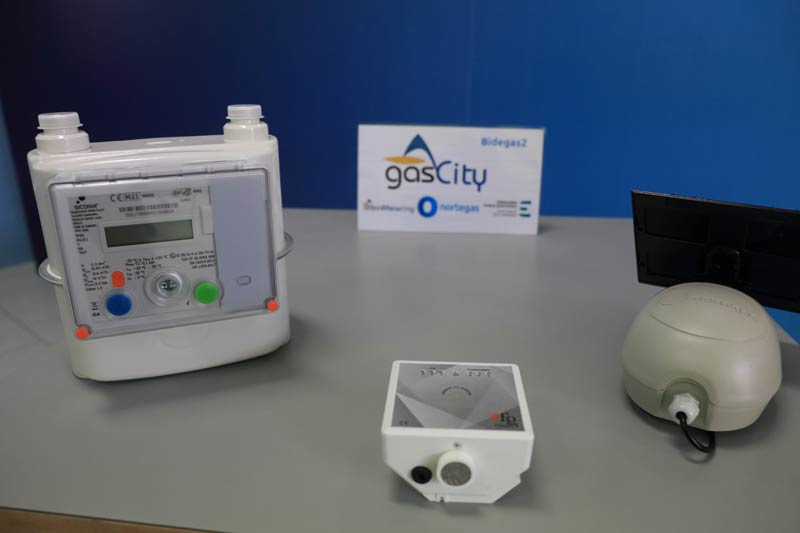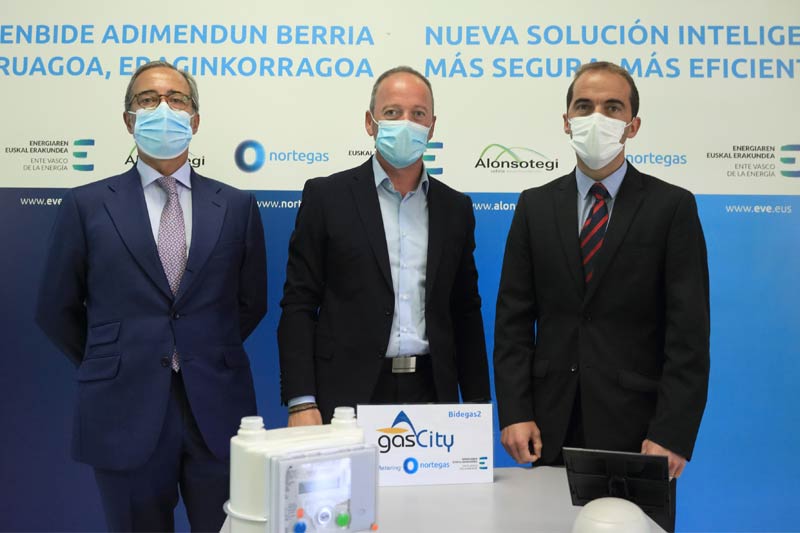- The Bidegas II project will replace the existing meters in Alonsotegi with new digital ones, which will provide essential information for the distributor. They will also immediately trigger the alarm and facilitate remote access to cut off the supply if necessary for a breakdown or leak. This will enable safer and more efficient management of the consumption.
- The project is a step further in the digitalisation of the gas network. It carries on from the Bidegas I project, that Nortegas successfully implemented with the support of the Basque Energy Board in Ugao-Miraballes between 2019 and 2020.
- Bidegas II will get underway in September, with the installation of 752 meters, detectors and concentrators in Alonsotegi, in order to be able to receive data from next October. The project will last six months.
Nortegas, the second natural gas distributor in Spain, the Basque Energy Board (EVE) – the Basque Government’s energy agency – and Alonsotegi Local Council has presented Bidegas II this morning. The project seeks to drive smart gas networks by installing cutting-edge telecommunication and electronic elements. The aim is to thus conduct a real study of the advantages of this technology over the current analogue one.
Bidegas II will involve replacing, completely free of charge for the users, the small industry, commercial and residential meters in Alonsotegi with new digital ones. The digital meters have the necessary technology to regular send safety and consumption data to a Nortegas information analysis and management platform.
This project will implement a new technology that is being tested for the first time in gas distribution. It is LoRaWAN, a wireless communication system that manages long-range and low power communication networks designed for the Internet of Things (IoT). This system has modulation and optimised communication specification to manage multiple electronic equipment at long distances and with low energy consumption.
The Mayor of Alonsotegi,
Joseba Urbieta, expressed his satisfaction with this new project because “
thanks to its implementation, we will be able to use the new technologies and benefit from a smart gas network. In turn, our local residents will have the opportunity to obtain real and constant information on the consumption of their facility.” Therefore, “
the Local Council thus considers it a very interesting avenue to facilitate communication between the company and the users,” he added.
The LoRaWAN infrastructure consists of transmission and reception bridges distributed through the coverage area, in the case in the Alonsotegi municipality. The bridges are connected at one end to the monitoring and control system (via Ethernet or 4G telephony) and at the other to the equipment deployed in the field (meters, pressure, methane and CO sensors, etc.) by means of a wireless communication.
These facilities will provide essential information for the distributor. They will also immediately trigger the alarm and facilitate remote access to cut off the supply if necessary for a breakdown or leak. This will enable safer and more efficient management of the consumption. In turn, users, who will remain anonymous to the distributor, may access their consumption patterns, thus incentivising a more sustainable use of energy in their daily activities. Furthermore, the distributor shall install CO and methane detectors in business premises and residential homes. The detectors will send information on the concentration of those gases in the air to the same system.
The project is a further step in the digitalisation of the gas network, building on the Bidegas I project, which Nortegas and the EVE successfully implemented in Ugao-Miraballes between 2019 and 2020. On this occasion, new technologies are being incorporated that will allow the telecommunications infrastructure to be reduced, with a fewer number of concentrators (the devices that collect the signal from the meters and detectors), at the same time as expanding the signal. This also results in a lower environmental and visual impact of these devices in the town’s streets.
Thus,
“in Alonsotegi, we are taking a step further to the future, by committing for a more sustainable and energy more efficient municipality. We believe that it is important to work in this line in order to guarantee responsible care for the environment and, at the same time, to prioritise the safety of our local residents, as they will receive any alert immediately,” explained Urbieta.

The users will have a mobile application which they can use to communicate with Nortegas and access their consumption data, notifications of interest, safety tips or messages on the system and its servicing, along with immediate information on any incident.
Bidegas II will get underway in September, with the installation of 752 meters, detectors and concentrators in Alonsotegi, in order to be able to receive data from next October. The project will last six months.
Javier Contreras, Nortegas’s Managing Director, stressed that
“we are delighted to be able to continue with the Bidegas project. Implementing these new technologies is essential to be able to extend their use to all municipalities. The digitalisation of the energy sector is in line with the European Industrial Strategy and the Green Deal driven by the European Union, which invites countries to digitalise their economic activities as a key factor for development. Nortegas shares this goal and we are working on it by means of innovative projects that seek to underpin and accelerate the process to a more sustainable future”. He went on, “
the smart meter offers many more advantages over the analogue one, both to foster more aware and responsible consumption and to make the distribution networks safer, a priority goal of Nortegas”.
The General Manager of the Basque Energy Board,
Iñigo Ansola, stressed the importance of
“continuing to be committed to energy efficiency by means of introducing innovative technologies that allow us to make a more rational use of energy, as we must consume less and better”. Furthermore, he highlights the role of natural gas as a source of support for the energy transition in the Basque Country towards a new more efficient model, where renewables are increasingly more important in the supply mix.

 The users will have a mobile application which they can use to communicate with Nortegas and access their consumption data, notifications of interest, safety tips or messages on the system and its servicing, along with immediate information on any incident.
Bidegas II will get underway in September, with the installation of 752 meters, detectors and concentrators in Alonsotegi, in order to be able to receive data from next October. The project will last six months.
Javier Contreras, Nortegas’s Managing Director, stressed that “we are delighted to be able to continue with the Bidegas project. Implementing these new technologies is essential to be able to extend their use to all municipalities. The digitalisation of the energy sector is in line with the European Industrial Strategy and the Green Deal driven by the European Union, which invites countries to digitalise their economic activities as a key factor for development. Nortegas shares this goal and we are working on it by means of innovative projects that seek to underpin and accelerate the process to a more sustainable future”. He went on, “the smart meter offers many more advantages over the analogue one, both to foster more aware and responsible consumption and to make the distribution networks safer, a priority goal of Nortegas”.
The General Manager of the Basque Energy Board, Iñigo Ansola, stressed the importance of “continuing to be committed to energy efficiency by means of introducing innovative technologies that allow us to make a more rational use of energy, as we must consume less and better”. Furthermore, he highlights the role of natural gas as a source of support for the energy transition in the Basque Country towards a new more efficient model, where renewables are increasingly more important in the supply mix.
The users will have a mobile application which they can use to communicate with Nortegas and access their consumption data, notifications of interest, safety tips or messages on the system and its servicing, along with immediate information on any incident.
Bidegas II will get underway in September, with the installation of 752 meters, detectors and concentrators in Alonsotegi, in order to be able to receive data from next October. The project will last six months.
Javier Contreras, Nortegas’s Managing Director, stressed that “we are delighted to be able to continue with the Bidegas project. Implementing these new technologies is essential to be able to extend their use to all municipalities. The digitalisation of the energy sector is in line with the European Industrial Strategy and the Green Deal driven by the European Union, which invites countries to digitalise their economic activities as a key factor for development. Nortegas shares this goal and we are working on it by means of innovative projects that seek to underpin and accelerate the process to a more sustainable future”. He went on, “the smart meter offers many more advantages over the analogue one, both to foster more aware and responsible consumption and to make the distribution networks safer, a priority goal of Nortegas”.
The General Manager of the Basque Energy Board, Iñigo Ansola, stressed the importance of “continuing to be committed to energy efficiency by means of introducing innovative technologies that allow us to make a more rational use of energy, as we must consume less and better”. Furthermore, he highlights the role of natural gas as a source of support for the energy transition in the Basque Country towards a new more efficient model, where renewables are increasingly more important in the supply mix.

